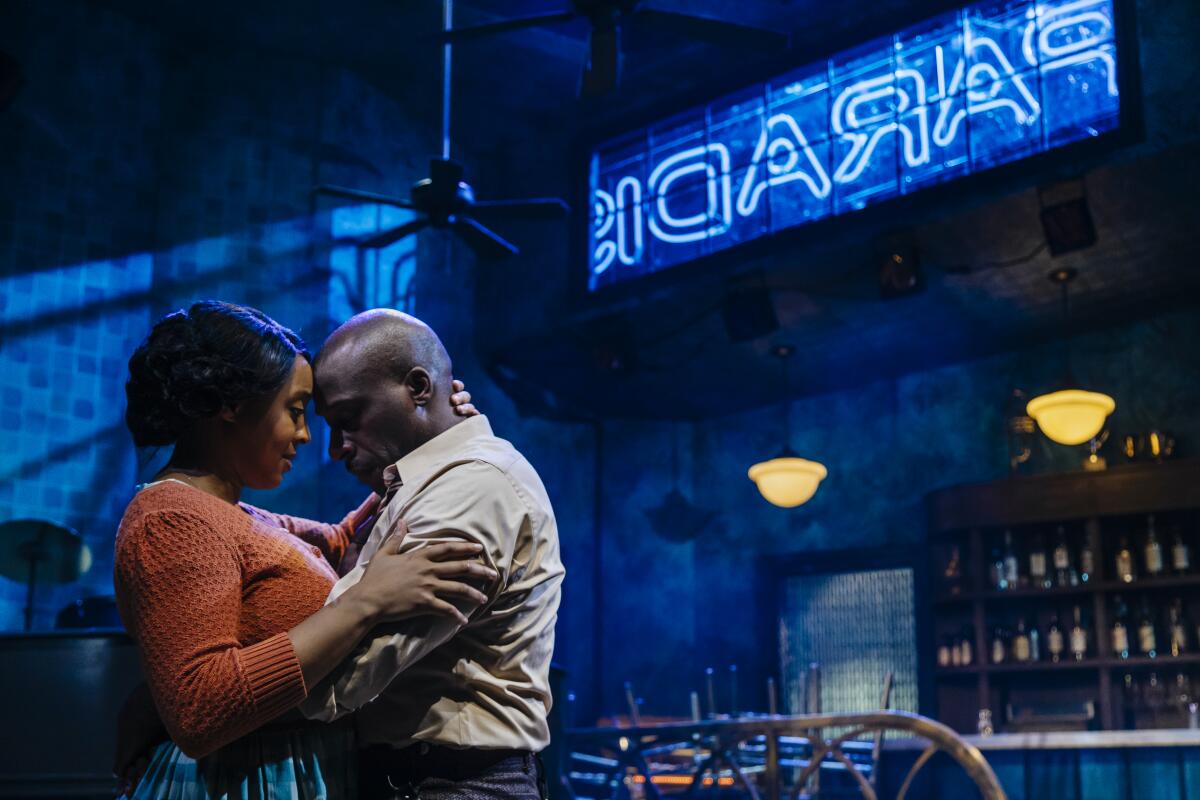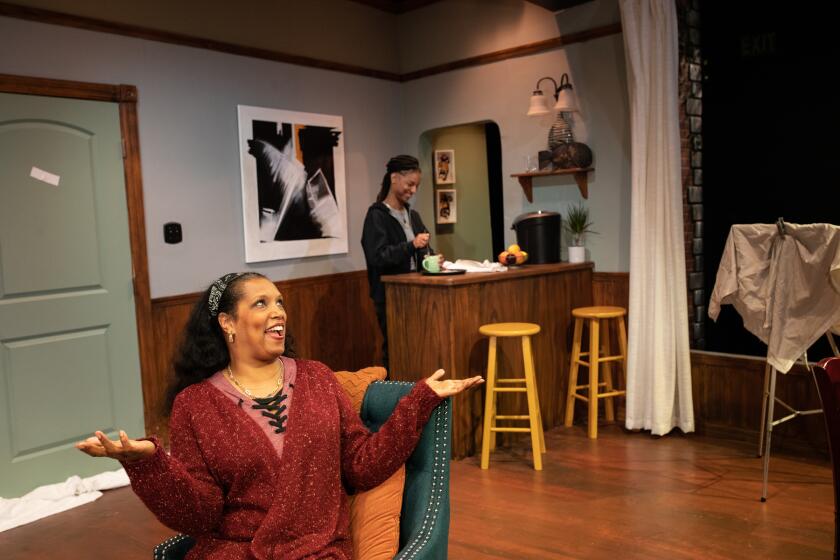Review: Suspenseful noir and Detroit history converge in Dominique Morisseau’s ‘Paradise Blue’

- Share via
“Paradise Blue,” one of the three plays in Dominique Morisseau’s “Detroit Project” series chronicling the generational struggles of the Black community in her native city, takes place in a jazz joint on a downtown strip known as Paradise Valley.
The year is 1949, a little more than a decade before the neighborhood known as Black Bottom was demolished in a redevelopment program that ran a highway through an area that was a vibrant hub of Black-owned businesses.
Detroit’s incoming mayor, Albert Cobo, has promised to rid the city of urban “blight.” The characters who work at Paradise Club and live upstairs in the rooming house can’t help feeling that a target has been placed on their backs.
Under the direction of Stori Ayers, an actor with a long collaborative history with the playwright, this production of “Paradise Blue” (at the Geffen Playhouse through Dec. 12) makes a compelling case for a play that proudly parades in vintage genre clothing. Reviews were mixed for the New York premiere in 2018, but this ensemble cast drama is well served by the character-centered nature of Ayers’ staging.
Sociopolitical context is crucial in “The Detroit Project” plays. For “Skeleton Crew,” which had a production at the Geffen in 2018 and is opening on Broadway in January, the focus is on the faltering auto industry as the 2008 Great Recession kicks into gear. In the background of “Detroit ’67” is the riot that brought clashes between Black residents and the police in the play’s title year.
“Paradise Blue” is set in an era when misguided policies of urban renewal led to the erasure of predominantly Black neighborhoods. This social history, while crucial to the plot, sometimes gets lost in the shuffle of dramatic narratives. Story drowns out all other concerns. But it’s hard not to become absorbed in the motivations and maneuverings of the play’s fully drawn characters, whose future hinges on the fate of a club that, despite its lost luster, is still something of a local landmark.
Blue (Wendell B. Franklin), the trumpeter who owns Paradise Club, knows the city is willing to pay a “pretty penny” for his property. He’s devoted to the music he regularly performs with a couple of other musicians who board there, Corn (John Earl Jelks) and P-Sam (Alani iLongwe). But he’s considering selling the place, which belonged to his father and carries some violent family memories that Blue fears may be derailing his artistic dreams.
Pumpkin (Shayna Small), Blue’s girlfriend, cooks and cleans and calls herself a “go-along gal.” Happy to finally have a home, she’s content to look after the men at Paradise Club. But an unspoken longing in her finds expression in the poems of Harlem Renaissance writer Georgia Douglas Johnson. Reciting this verse to anyone who will listen refreshes Pumpkin’s persevering spirit.
Into this world sashays Silver (Tyla Abercrumbie), a widow wrapped in noir mystery. She has money, a mind of her own and, if the rumors are true, a murderous history. Once she unpacks her lingerie and jazz records upstairs, the equilibrium of Paradise Club will never be the same again. (Edward E. Haynes Jr.’s set, enlivened by Alan C. Edwards’ moody lighting, lays out this world with clever economy.)
“Paradise Blue,” which tries to juggle an impossible number of plots, owes a clear debt to August Wilson’s 10-play cycle. The gentrification drama evokes aspects of “Jitney” while the artistic tensions of the band members recall the squabbling musicians of “Ma Rainey’s Black Bottom.”
There’s a touch of “Fences” in the way Blue is oppressed by the memory of his brutal father. But perhaps the play that looms largest is “Joe Turner’s Come and Gone.” It’s not just the setup of a mysterious newcomer disturbing the order of a makeshift family but also the profound desire of the characters to find their song — or music, as Corn, who’s coaching an inexperienced Pumpkin to sing, describes this spiritual quest.
Playwrights’ Arena and Skylight Theatre Company present the world premiere of Inda Craig-Galván’s ‘A Hit Dog Will Holler.’
With Silver’s seductive languor and quick, calculating eye the play may also jog a few memories of Tennessee Williams’ “A Streetcar Named Desire.” Pumpkin, as domestically grounded as Stella, is both fascinated and appalled by Silver, who’s as dangerous as Blanche DuBois to the stability Pumpkin has tenuously found with a man every bit as volatile as Stanley Kowalski.
About Silver, Corn exclaims, “She’s got some kinda walk on her, ain’t she?” Abercrumbie, curvaceously accentuated in Wendell C. Carmichael’s striking costumes, knows how to cast a spell with a strut. Blue senses she’s trouble, but Corn, a widower, is hypnotized by this woman, who awakens the dormant lover in him. (Jelks, a seasoned veteran who was in Lynn Nottage’s “Sweat” in New York and at the Mark Taper Forum, brings Corn’s transformation to life in all its touching humor.)
Morisseau is extremely skillful in creating a fertile theatrical landscape in which the actors can lay down roots. The shifts in character relationships occur with a naturalness that allows not just the performers to make discoveries but also the audience.
Special attention is paid to the connection between the women, which unfolds as much in glances as in words. Behavioral details speak volumes throughout. It takes some time to learn the cause of Pumpkin’s painful wrists, but the way she rubs them reveals a good deal about her life with bad-tempered Blue. Silver’s twinges of disappointment whenever Pumpkin rejects her help give us a sense of the sadness that Corn detected in her when he first admired her walk.
The delicacy of the acting manages for the most part to withstand the melodramatic pressures that are placed on the characters. A gunshot that goes off at the start of the play is traced backward in a plot that might have more in common with films from the period in which the play is set than with contemporary drama.
The battle at the heart of “Paradise Blue” is for control of Paradise Club, which is a home for Pumpkin, a stake in the ground for Silver, a place of artistic freedom for P-Sam, a community for conciliatory Corn and a burdensome legacy for Blue. At the same time, it’s a bulwark of Black culture and enterprise in a neighborhood that’s imperiled by the joint forces of politics and money.
As in “Skeleton Crew,” Morisseau recognizes that for her characters work isn’t just a paycheck but an identity. One of the most stirring moments in the play is when P-Sam, hearing that Blue has decided to go ahead and sell the club, erupts in a defiant dignity: “You might be the one to own it, but you ain’t the one to make it. We all make this Paradise.”
This sentiment is more powerful than what follows. The ending, though perhaps true to the style of noir, feels more like a bold gesture than a convincing inevitability.
The strained final note shouldn’t detract too much from a drama that is otherwise so richly observed and inhabited. Under Ayers’ direction, this Geffen production conjures to the stage a living narrative full of personal truth and sweeping history.
'Paradise Blue'
Where: Gil Cates Theater at Geffen Playhouse, 10886 Le Conte Ave., L.A.
When: 8 p.m. Tuesdays-Fridays, 3 and 8 p.m. Saturdays, 2 and 7 p.m. Sundays. Ends Dec. 12.
Tickets: $39-$129
Contact: (310) 208-2028 or geffenplayhouse.org
Running time: 2 hours, 15 minutes, including one intermission












